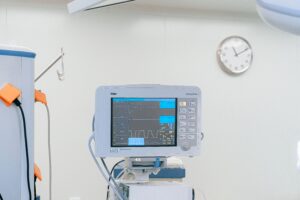Blog

Any change in your heart’s usual beat can be concerning. Heart palpitations can make you worry if something’s wrong with your heart.
At HeartCare Associates of Connecticut, LLC, our team understands how scary heart flutters and palpitations can be. We offer comprehensive in-office services to give you an accurate diagnosis and ensure that you get any treatment you might need.
An overview of heart palpitations
Heart palpitations feel like a fluttering, pounding, or racing feeling in your chest. Generally, these sensations occur because of changes in the rhythm of your heart, a condition known as an arrhythmia.
When you feel your heart flutter or beating too fast, you might also experience other worrisome symptoms like:
- Dizziness
- Lightheadedness
- Shortness of breath
- Chest tightness or pain
Many people also feel a racing heartbeat in their neck or throat. In some cases, heart palpitations can cause fainting, especially in people who have existing heart disease.
If you experience recurrent heart palpitations, we recommend that you schedule a diagnostic evaluation at HeartCare Associates of Connecticut, LLC, as soon as possible. Through a comprehensive exam of your heart and overall health, we can help pinpoint the cause of your palpitations and get you the treatment you need.
Why you may have heart palpitations
Heart palpitations can occur for a variety of reasons, many of which are harmless. Some of the common reasons your heart might beat too fast or flutter on occasion include:
- Fever
- Stress
- Anxiety
- Depression
- Strenuous exercise
- Hormone changes
- Thyroid disorder
You might also develop heart palpitations if you use certain stimulants like nicotine, caffeine, and over-the-counter cold medications.
More serious conditions that can trigger heart palpitations include arrhythmia and underlying heart disease. If left untreated, you might be at increased risk for stroke, heart attack, and heart failure.
Uncovering the cause of heart palpitations
Our team offers several on-site heart tests to evaluate the function and overall health of your heart. You might need blood work to check your thyroid and hormone levels.
We also offer heart tests like electrocardiograms (ECGs) that measure the electrical activity in your heart and exercise stress tests that monitor your heart’s activity during exercise and while at rest.
In some cases, you might need to wear a Holter monitor, a portable ECG machine that records your heart’s activity for 24 hours or longer to detect abnormalities in your heart’s rhythm.
Once we understand what’s contributing to your heart palpitations, we can work with you on a treatment plan to reduce the fluttering and racing episodes and improve your overall health.
Lifestyle changes are your first line of defense
Often, people need to become more aware of what’s triggering their heart palpitations. Our team at HeartCare Associates of Connecticut, LLC, will start by teaching you mindful breathing techniques and relaxation exercises to help reduce stress.
You should also reduce your intake of caffeine, nicotine, and other stimulants that can contribute to heart palpitations. Our team can help you improve your daily nutrition to support heart health.
If you have an arrhythmia or another underlying heart condition, we can customize a treatment plan to treat it. We focus on protecting the long-term health and function of your heart using the latest treatments available.
Call the HeartCare Associates of Connecticut, LLC, office nearest to you to schedule a diagnostic evaluation today.

Life-Saving Reasons to Get a Nuclear Cardiac Scan
Over 6 million Americans live with heart failure, and four out of five people don’t know they have it! This is because symptoms of heart issues aren’t always severe at first — But can end up in a visit to the emergency room. Early detection of heart disease and other conditions can be life-saving. Heart

6 Tips for Summertime Health
The summertime might mean fun vacations to the beach, outdoor adventures, and backyard barbeques, but it can also be a dangerous time for your heart. More than 600 people in the United States die each year from extreme heat. Hotter temperatures are known to put a strain on our cardiovascular health. This is especially true

What to Expect at a Cardiovascular Disease Screening
Cardiovascular disease kills one person every 33 seconds in the United States. Heart disease is the leading cause of death for many racial and ethnic groups in the U.S. Taking care of your heart is vital to your overall health and well-being. That’s why it’s important to have regular cardiovascular health screenings to assess your

National Stroke Awareness Month
More than 130,000 people die yearly from strokes in the U.S. Many others who survive are left with temporary or permanent disabilities. We understand it can be scary to think about the possibility of a stroke. But luckily understanding the signs, knowing what to do, and taking preventative measures can help to avoid the severe

5 Tips for Your Healthiest Spring Yet!
It’s officially spring! A time of reflection, celebration, and excitement as new growth beginsto sprout up from the once-frozen ground. Nature is reawakening to a fresh start, and youcan too!As we welcome colorful flowers, longer days, and warmer temps, it’s a great reminder to getmoving. If you made resolutions to improve your exercise routine and

The Vein Venter at Heartcare Associates of Connecticut
March is already here! That means we’re another step closer to warmer temps, being active outdoors, and welcoming new spring flowers. With so much to look forward to, the last thing you want to worry about is not feeling comfortable in your own skin. Unfortunately, many struggle this time of year due to unsightly varicose









